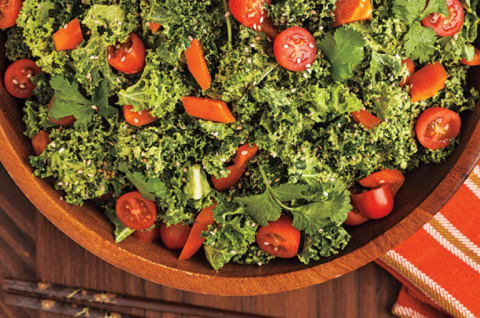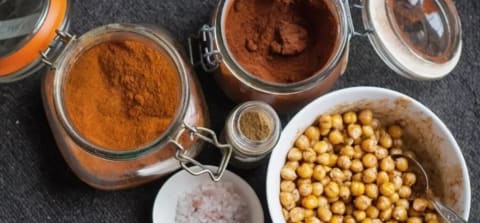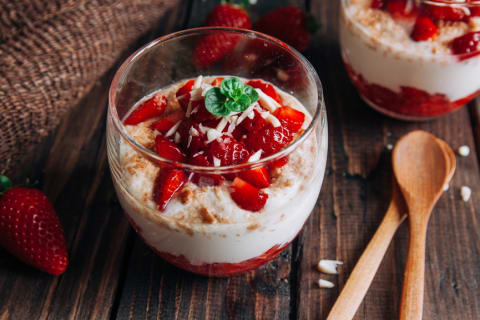Advertisement
Exactly What To Eat (And What To Avoid) To Have A Great Period


If you’re like most women, you’ve spent the majority of your menstrual years believing that pain and suffering in the form of PMS is inevitable. What if I told you that was not only untrue, but that the key to preventing, treating, and eliminating PMS—once and for all!—was in your kitchen?
Let’s back up a second. Maybe you got stuck on the part where I debunked centuries of internalized mythology around the inevitability of female suffering.
Just take it in for a second: PMS is not necessary. Monthly kill-me-now cramps, balloon-like bloating, roller coaster mood swings, and seemingly insatiable cravings are. not. your. destiny.
So why is PMS considered such a “thing”? And why do so many women have it? In a word: hormones. I could go on and on about the many reasons so many of us are battling hormone imbalances (including poor sleep, stressful schedules, and unhealthy lifestyle choices that are negatively affecting our health). But if there’s one impactful area that needs a major overhaul in almost every one of my clients, it’s diet. I always recommend starting by looking at your diet, and then monitoring your symptoms (I love using an app like MyFLO to get specific recommendations for the individual symptoms) if you need to take your journey further.
By changing what you eat, you can actually help support your endocrine system and supply your body with the tools it needs to process and eliminate hormones in the optimal way.
Food has an undeniable, direct, tangible influence on all of your body’s functions—including menstruation.
Eating the right foods can give a major boost to your energy, appearance, sex drive (yes, really), and more. Eating the wrong foods can set you up for acne, weight gain, irregular periods, mood swings, and even depression.
Here’s how you can start improving your health, regulating your hormones, wiping out PMS, and getting your period back on track immediately. Check out my list of the foods that could be sabotaging your success. Then, see which of the good-for-you foods could be missing from your diet, and how you can start including them now to help heal your hormones:
What to avoid
Caffeine
Believe it or not, just a single cup of coffee can throw off your endocrine system for a full 24 hours. That’s because the stimulant messes with your blood sugar and cortisol levels, and your body’s left struggling to reset for the rest of the day. It also depletes essential micronutrients and minerals, which of course exacerbates issues like PCOS, endometriosis, fibroids, and more.
Soy
It may have a healthy-ish reputation, but not all soy is created equal. While the unprocessed, organic, fermented kind can be helpful in small amounts, ingesting the highly processed kind that’s abundant in products like soy milk, soy cheese, and soy meat can worsen estrogen-dominance.
White potatoes
Yes, French fries count. Consider starchy foods the same as sugar as far as your body is concerned. They cause your blood sugar levels to spike and crash quickly, and this can have a long term impact on your health. However, you don’t have to swear off all kinds of potatoes—the sweet kind are special (more on that below).
GMO foods grown with pesticides
If you’re not buying organic, it’s time to start. Just making this one switch can have a significant impact on your health in a matter of weeks. Conventionally grown, pesticide-laden1 and genetically modified foods are covered in chemicals that add additional synthetic hormones to your body, hampering your liver’s ability to detoxify and further worsening your hormonal issues.
Artificial sweeteners
Even if you avoid those little pink and blue packets at the coffee shop, you might still be consuming a ton of fake sugar, since artificial sweeteners are on so many ingredients lists, and they’re no healthier than actual sugar. Many still cause the same disruptive blood sugar spikes and crashes. If you must have a touch of added sweetness, try honey or coconut nectar, as they have the least impact on blood sugar changes.
What to eat
Leafy greens
Kale is hot and trendy for a reason! It contains indole-3 carbinol, a powerful hormone balancer that promotes proper estrogen metabolism. Not into kale? It’s also found in all other members of the brassica family of greens.
Try it: This cleansing kale salad with cilantro tahini dressing takes just minutes to throw together.

Sweet potatoes
See, I told you you’d get your potato fix! Sweet potatoes are packed with vitamin A, which helps your liver break down excess estrogen and balances out your blood sugar, as well as your mood. Not to mention, it’s a wholesome way to successfully satisfy your sweet tooth
Try it: These sweet potato pancakes have a surprising ingredient that massively increases their protein content (no, it's not protein powder!).

Bone Broth
Try it: This bone broth hot chocolate will blow your mind. We're not joking. Don't ask questions, just try it.

Chickpeas
The B6 in chickpeas helps boost progesterone, combatting stress and other period-related issues.
Try it: These crunchy, spicy chickpeas will knock out any potato chip craving and help with your hormones. Win-win!

Coconut Yogurt
While it’s important to steer clear of dairy and soy, the live probiotics in yogurt are important for your gut, which is why I love coconut yogurt. The good fats will also help stabilize your mood and prevent cravings
Try it: Make your own coconut yogurt—it's not nearly as hard as you'd think!



















